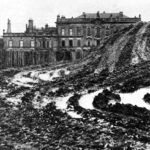4 September 1947: Conflicting hopes for the future of the nationalised coal industry, as a wildcat strike against increased hours at Grimethorpe spreads through the South Yorkshire coalfield
Times. 1947/09/05. Strikes at 50 Pits. London. Get it:
.Unedited excerpt
If an excerpt is used in the book, it will be shorter, edited and, where applicable, translated.
STRIKES AT 50 PITS
GAS CUTS AFFECT STEEL WORKS
The Yorkshire coalfields sympathy strike with the miners who stopped work at Grimethorpe Colliery had spread to 49 pits yesterday. Attempts to settle the dispute will be renewed to-day, and the outcome will have important effects on industry in the north-eastern area. Output at Sheffield steel works has already been affected by a request that gas consumption be reduced.
Better news yesterday was that a strike of colliery clerks had been averted.
The pits reported to be at a standstill yesterday were:-
Grimethorpe, Ferrymoor, Thorne, Houghton Main, Darfield, Mitchell Main, Upton, Frickley, South Kirkby, Monckton (three pits), Kilnhurst, Manvers Main, Barnborough, Silverwood, Markham Main. Yorkshire Main. Highgate, Goldthorpe, Darton, Wharncliffe Woodmoor (five pits), North Gawber, Barrow, Barnsley Main, Monk Bretton, Dodworth, Wombwell, Wath Main, Haigh, New Silkstone, Newmillerdam, Hatfield, and Rockingham.
Partial stoppages were reported at:-
Aldwarke, Redbrook, Woolley, Thorncliffe, Shuttle Eye, Cadeby, the new pit Nostell, Crigglestone, Caphouse, Askern, Cortonwood, and Bentley.
The strike spread yesterday to more pits in the Barnsley and the Wakefield districts. The worsening of the situation has led to fears that unless an early solution is reached there is danger of a complete county stoppage.
MEETING TO-DAY
Mr. Shinwell, Minister of Fuel and Power, is meeting the National Coal Board and National Union of Mineworkers’ officials to-day. A solution will be sought to the problem set by the 140 miners in the Melton Field of Grimethorpe Colliery, whose refusal to work an extension of their coal-face stint led to the dispute. The Mineworkers’ Union’s statement on Wednesday, asking the men to work the extra stint and to allow a committee of miners to investigate the position, has not proved acceptable.
A Coal Board spokesman said yesterday: “This is the test case of our authority. We cannot afford to have our prestige shaken by withdrawing the extra stint order.”
The comment of the National Union of Mineworkers was: “We do not like to feel that our orders and requests to the men are being so flagrantly disobeyed.”
The strikers said: “If we lose now, officialdom will make us their doormats. We are sticking out for a principle against a new kind of officialdom.”
INCREASED PRODUCTION
Mr. Horner, secretary of the N.U.M., yesterday confirmed that a special conference of the miners’ national executive would be held in London on Thursday to re-examine the whole question of increased production. The executive would consider a letter from Mr. Shinwell to the National Coal Board and the N.U.M. asking them to reopen negotiations on the lengthening of the working week in the pits. The strike is costing about 60,000 tons of coal a day, and industries in the north-eastern area have started to make fuel cuts. The Sheffield Gas Company has asked firms to reduce consumption voluntarily by as much as 50 per cent.
An official of the English Steel Corporation, employing between 7,000 and 8,000 men, said yesterday that its heat treatment plants had been brought to a standstill, and this had affected the drop forge department and bar mills. Furnaces in the heavy forge departments had also been shut.
NO CLERKS’ STRIKE
The threat of a strike of colliery clerical workers, which was to have begun to-morrow, has been removed by an announcement by Mr. W. P. Allen, on behalf of the General Council of the Trades Union Congress at Southport yesterday, that agreement had been reached between representatives of the Clerical and Administrative Workers’ Union and the National Union of Mineworkers on recognition of the clerical workers’ organization. Discussions between the two unions will take place at a meeting on September 12.
Comment
Comment
Re this wave of unofficial strikes:
Major-General Sir Noel Holmes, chairman of the north-eastern division of the National Coal Board, in a statement yesterday on the strike at Grimethorpe Colliery, said that 140 coal-face workers, out of 2,682 employed at the pit, were not doing a fair day’s work. A committee representing management and workmen had decided that the stint for the 140 workers should be increased by 2ft., but they refused to accept its findings and came out on strike. The other coal-face workers came out in sympathy. “As much as I dislike mentioning this fact,” said Sir Noel Holmes, “it is only right to recall that at Grimethorpe since January 1, 1947, and before the present strike, there have been 26 sectional unofficial stoppages, which have lost 33,000 tons of coal to the nation. The present stoppage up to date represents a further loss of more than 40,000 tons.” (Times 1947/08/27)
Holmes’s Wikipedia article curiously doesn’t mention this phase of his career.
I’m guessing that the Welsh ex-Puritan authoritarian Communist Arthur Horner is the voice of the NUM in the above – see e.g. the Times for 9 September.
Interesting comments on the wartime coal boards by T.S. Charlton, colliery manager at Cortonwood:
The management of the collieries is in the hands of men trained primarily in management of mines and miners. They have a working knowledge of all the machinery available and how best it can be used, but the details of this side are left to the mechanical and electrical engineer. Labour costs are two-thirds of production costs, and therefore the handling and the best use of men are of the greatest importance to managers. Why it should have been decided that labour leaders should be good labour directors is, apart from the political issue, difficult to understand, unless it is on the old adage of “poacher turned gamekeeper.” Unless and until the production director has control of his labour side, I can see little hope of his schemes proving effective.
The miners have put forward suggestions to improve output, but they appear to do no more than improve the position of the miner. Can it be said that any suggestion already put forward by the men has put up the output figure? Why should it be assumed the men’s side of the pit production committees should be able to improve output in any way? Their training, inclinations, and very job depend upon their obtaining the best for their electors rather than for production.
(Charlton 1943/12/01)
Charlton was clearly a clever and capable man – it would be good to know more about him.
Something to say? Get in touch
Similar
 4 July 1838: 26 girls and boys drown trying to escape via a tunnel from flash flooding in Huskar Colliery, Silkstone, Barnsley, after the steam lifts fail during a rainstorm
4 July 1838: 26 girls and boys drown trying to escape via a tunnel from flash flooding in Huskar Colliery, Silkstone, Barnsley, after the steam lifts fail during a rainstorm 8 April 1946: Yorkshire miners’ president Joe Hall threatens strike action if Labour starts opencast mining in Lord Fitzwilliam’s gardens at Wentworth Woodhouse (Rotherham)
8 April 1946: Yorkshire miners’ president Joe Hall threatens strike action if Labour starts opencast mining in Lord Fitzwilliam’s gardens at Wentworth Woodhouse (Rotherham)
Comment
Comment
Bromley seems to have been stationed at Rotherham at the time.
I haven’t read Priestly despotism rampant, (Martin 1853), but Bromley seems to have been suspended or expelled from Wesleyan Conference for extremism a dozen years later, so he his views and methods may already have been unconventional.
Something to say? Get in touch
Search
Donate
Music & books
Place-People-Play: Childcare (and the Kazookestra) on the Headingley/Weetwood borders next to Meanwood Park.
Music from and about Yorkshire by Leeds's Singing Organ-Grinder.


 Bluesky
Bluesky Extwitter
Extwitter